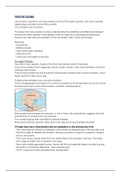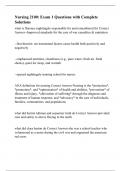Introduction
Developmental psychology can be defined as the study of how humans develop
cognitively, emotionally, and socially throughout their lives. The three components of
development are biological, cognitive, and socioemotional. The cognitive dimension
has many elements: attention, memory, abstract thought, information processing
speed, and social intelligence. Developmental psychology studies how children grow
and change from newborn through adulthood. Understanding developmental
psychology is essential because it gives us new knowledge about how people learn,
grow, and develop. We can use that knowledge to shape education policy, parenting
strategies and even ways to improve healthcare practices (McLeod, S. A., 2017).
This book chapter will address the following topics: what is developmental
psychology, the importance of developmental psychology, Piaget's cognitive theory
and Bowlby's attachment theory.
1
, What is Developmental Psychology?
Psychology studies the mind and behaviour, including conscious and unconscious
events like emotions and thoughts. Development psychology focuses on how a
person's thinking, feelings, and behaviours change throughout life (Mcleod, S.,
2017).
Historically, developmental psychology originated in the Western world. It is said that
Charles Darwin carried out the first thorough research of developmental psychology.
He wrote a brief study about the evolution of fundamental forms of communication in
1877, based on research he had done on his son Doddy (Darwin, 1877). The Mind of
the Child, a book written by German psychologist Wilhelm Preyer, was published in
1882, and this is when developmental psychology first emerged as a distinct field of
study. Preyer records his own daughter's growth and development in his book from
birth to two and a half (Preyer, 1888). These three concepts continue to have a
significant effect on contemporary research. Three essential individuals who
developed comprehensive theories of human development during the 1900s — Jean
Piaget (1896–1980), Lev Vygotsky (1896–1934), and John Bowlby (1907-1990) have
dominated the discipline.
Developmental psychologists focus on three developmental questions: Continuity vs
Discontinuity, Nature vs Nurture and Stability vs Change. Developmental
psychologists explore continuity versus discontinuity. Continuity means patterns in
how people change over their lifetime, while discontinuity means there are breaks or
gaps in those patterns. Psychologists look for continuities to predict future
behaviours or determine whether others have replaced certain behaviours. For
2









